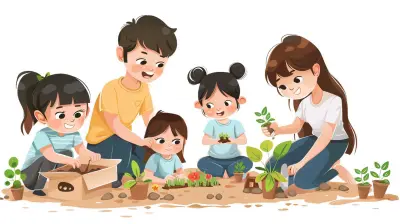Encouraging a Growth Mindset in Your Preschooler
15 July 2025
Raising little ones is both a joy and a challenge, right? One minute they’re building a tower out of blocks, the next they’re melting down because it toppled over. But here’s the thing—that meltdown is actually a golden opportunity. Yep, that’s the perfect time to gently nudge your preschooler toward something incredibly powerful: a growth mindset.
In a world that’s constantly changing, helping your child build this mindset early on is like giving them an invisible superpower, one that’ll help them bounce back, keep going, and thrive—no matter what life tosses their way.

What Is a Growth Mindset Anyway?
Okay, so first up—let’s talk about what we mean when we say "growth mindset."A growth mindset is the belief that our abilities, intelligence, and talents can grow over time through effort, learning, and perseverance. It’s the opposite of a fixed mindset, where people believe their abilities are set in stone.
Kids with a growth mindset are more likely to embrace challenges, learn from failure, and keep trying even when things get tough. Sounds like a dream, right?

Why Is It Important for Preschoolers?
You might be wondering, “Aren’t they a little too young for this kind of thinking?” Actually—this is the perfect age.Preschoolers are at a magical stage where they’re soaking up information like sponges and forming lifelong habits. Encouraging a growth mindset early helps them:
- Feel confident in their ability to learn
- Tackle problems with creativity
- Develop resilience when things don’t go their way
- Build a positive relationship with effort and hard work
It’s not about making them little overachievers—it’s about helping them fall in love with learning and believe in themselves.

How to Spot Fixed vs. Growth Mindset in Young Kids
Before we dive into how to teach it, let’s take a look at what these mindsets actually look like in action.Fixed Mindset Statements:
- “I can’t do it.”
- “I’m just not good at drawing.”
- “That’s too hard.”
- “I give up.”
Growth Mindset Statements:
- “I can’t do it yet.”
- “I’m going to keep trying.”
- “I’ll ask for help.”
- “Mistakes help me learn.”
Now, nobody (even adults!) has a perfect growth mindset all the time. But the goal here is to help your preschooler recognize fixed patterns and guide them to more growth-focused ways of thinking.
Practical Ways to Encourage a Growth Mindset in Your Preschooler
Alright, let’s get to the good stuff—real tips you can use every day to help your little one develop that powerful mindset.1. Praise The Effort, Not Just the Outcome
This one’s a game-changer. Instead of saying “You’re so smart” or “You’re amazing at puzzles,” try:- “I saw how hard you worked on that puzzle!”
- “You didn’t give up, even when it got tricky—great job!”
Why? Because praising effort reinforces the idea that success comes from trying, not just talent.
🧠 Quick Tip: Add detail when praising. “You really focused on finding the blue pieces first—that was a smart strategy!”
2. Use the Magic Word: "Yet"
The word “yet” is tiny but mighty. It shifts the focus from failure to progress. If your child says, “I can’t write my name,” you can gently respond with: “You can’t write it yet—but you’re getting closer every time you practice!”That little word keeps the door open. It tells their brain, “Hey, I’m on my way.”
3. Normalize Mistakes
Preschoolers hate making mistakes. (Heck, adults do too!) But mistakes are where growth happens. Try using phrases like:- “Oops! That didn’t go how we thought—what can we try next?”
- “I noticed you made a mistake—it’s okay, that’s how we learn!”
Better yet? Talk about your own mistakes. Kids love knowing you're not perfect either. Say something like, “Oops, I spilled the juice. I’ll clean it up and try to be more careful next time.” Boom—insta-life lesson.
4. Celebrate the Process
Think about how much energy your kid pours into building a LEGO tower. Whether it stands tall or topples over, that process is worth celebrating.Instead of focusing on whether they “won” or got it “right,” highlight what they learned, how they worked through it, and what they might try next time.
🎉 Activity Idea: Create a “Proud Wall” at home where you hang up drawings, tiny accomplishments, or photos of them trying something new.
5. Tell Stories of Struggle and Growth
Kids LOVE stories—so why not use that to your advantage?Tell them about famous people who worked hard and overcame challenges—like how Thomas Edison tried thousands of times before inventing the lightbulb, or how Moana kept going despite her fear.
Better yet? Share your own growth stories. “When I was your age, I couldn’t ride a bike either. I fell A LOT—but I kept practicing!”
6. Model Growth Mindset Yourself
Kids are little copycats. If they see you reacting to challenges with frustration or giving up quickly, they’ll likely do the same.Let them hear you say:
- “This is tricky, but I’m going to keep trying.”
- “I made a mistake, and that’s okay. I’m learning from it.”
Sometimes it’s less about what we say and more about what we do.
7. Reframe Challenges as Adventures
Preschoolers are naturally curious and love a good game or adventure. So why not reframe hard things as exciting missions?Instead of “You need to clean up your toys,” try: “Let’s see how fast we can clean up the blocks—like superheroes on a mission!”
Or when they’re struggling with their shoes, say: “This is just a tough level in the Shoe Game. Let’s beat it together!”
Turning an obstacle into play can defuse frustration and spark determination.
Growth Mindset Activities for Preschoolers
If you’re more of a "show me what to do" kind of parent—same. Here are some fun, easy activities to reinforce these ideas.Growth Jar
Every time your child tries something new or sticks with something tough, add a pom-pom to a clear jar. Watch it grow over time and celebrate when it fills up."Try Again" Songs
Make up silly songs about trying again. Sing them when something gets tough. Music makes everything feel more doable—and plants little seeds of resilience.Role-Playing with Toys
Have their favorite stuffed animals go through tricky situations. Maybe the teddy can’t climb the pillow mountain, but he says, “I’m going to keep trying!” It’s amazing what kids pick up from stories and play.Feelings Check-Ins
Talk about how it feels to try something hard. Give them emotional vocabulary.- “How did it feel when the tower fell?”
- “Did you feel frustrated, or maybe a little sad?”
Letting them name and explore their feelings helps them understand that emotions are part of the process.
The Long-Term Payoff
Building a growth mindset isn’t about one magical conversation. It’s a long game—a series of tiny moments, words, reactions, and encouragements that add up over time.And while it might seem small now, the benefits are huge:
- Better problem-solving skills
- Stronger emotional regulation
- A love of learning that lasts a lifetime
- The confidence to keep going—even when things are hard
Honestly? That’s one of the best gifts you can give your child.
Final Thoughts
Parenting preschoolers often feels like guiding little explorers through a jungle of emotions, fears, and endless questions. And while there’s no map, encouraging a growth mindset can be your compass.It’s not about perfection—it’s about progress. Every time your child says “I can’t,” and you respond with love, patience, and belief in their potential, you’re helping them build a mindset that will carry them through school, friendships, challenges, and eventually, adulthood.
So keep cheering them on. Keep modeling resilience. Keep celebrating the effort.
You’re not just raising a child—you’re raising a lifelong learner.
all images in this post were generated using AI tools
Category:
Parenting PreschoolersAuthor:

Liam Huffman
Discussion
rate this article
1 comments
Katie McQuillan
Embrace the messy journey of parenting! Fostering a growth mindset in your preschooler isn't just beneficial—it's essential. Celebrate failures as stepping stones and watch your child thrive with resilience and curiosity!
July 28, 2025 at 2:35 AM

Liam Huffman
Absolutely! Embracing the ups and downs helps children develop resilience and a love for learning. Each challenge is an opportunity for growth!


